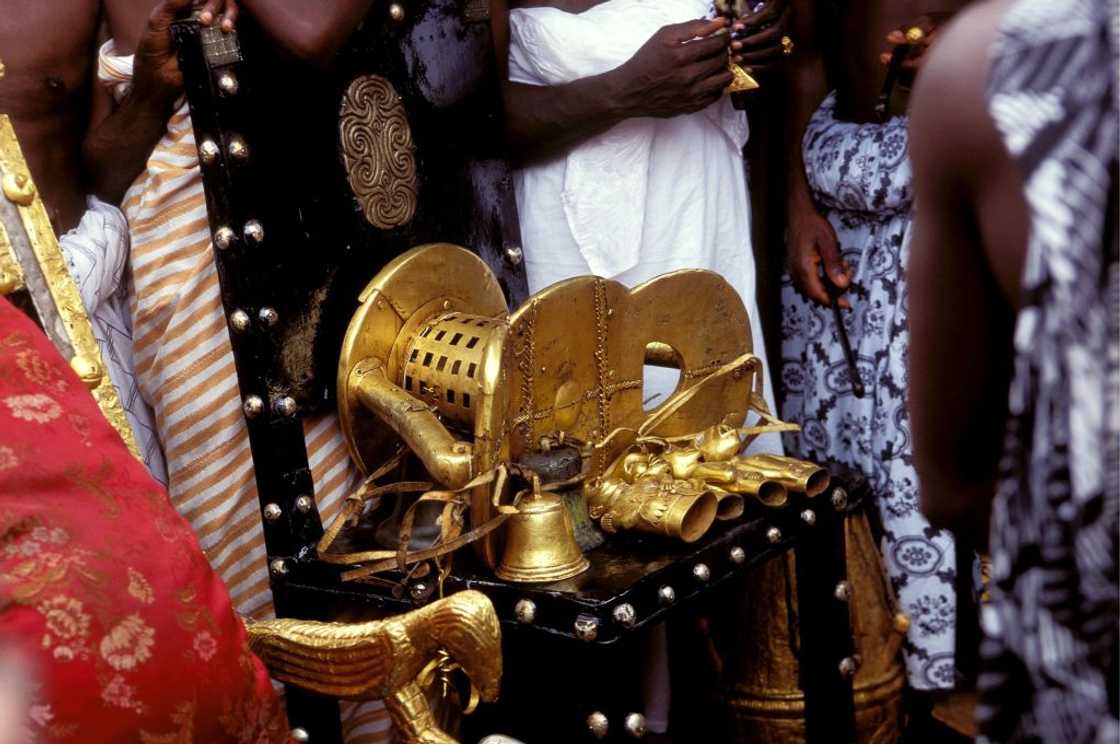The Golden stool in Ghana: history, meaning, and facts
A lot of interesting things surround the sacredness of the Golden stool in Ghana. One cannot undermine its mysterious appearance to confirm the legitimate king over the Asante Nation's kings and what it represents in their kingdom. Today, people from the region revere it with everything in them, even though very few people know its exact location.

Source: Getty Images
It is widely believed that the stool carries supernatural powers. Doom and chaos may fall on the region's people if the Golden stool is destroyed or stolen by enemies or foreigners. When was the Golden stool made? Also, what is its significance in the daily activities of the Asante people? These and other issues need to be clarified.
History of the Golden stool
According to oral tradition, Nana Osei Tutu of Kumase summoned a meeting of Asante states' chiefs to unite under one of the chiefs. While the chosen chief's stool would be greater than others, any of the states' chief enstooled was to swear the oath of allegiance to him.
Since they don't know who would be chosen head, Okomfo Anokye explained that the gods and the ancestors would solve the problem. He promised to pray to them to send a stool from the skies, and the chief on whose laps it descended and rest would be the chosen chief.
So, who brought the Golden stool? The high priest, Okomfo Anokye, is responsible for the golden stool's appearance. This was after they chose a festive Friday “Fofie” to meet for the gods and ancestors to choose their king for them. Okomfo instructed them to fast and pour libations to their ancestors and the gods until the chosen day.
Interestingly, Okomfo Anokye commanding the golden stool from the sky to rest on the legitimate king is not a myth for hearing sake. On that day, Anokye appeared while people were drumming and dancing. After some magical dances and conjures, the sky became tense, and everyone heard a deafening noise accompanied by lightning and thunderstorm.
Shortly after that, a stool studded with gold descended in a cloud of white dust on Nana Osei Tutu's laps, which connoted that the gods and ancestors had chosen him to be the unquestionable king over the kings of the Asante Nation. After they completed other rites, Osei Tutu became the first king of the Kingdom.
Meaning of the stool
Since the stool descended, it became traditionally symbolic of a chieftain's leadership. The Ashanti stool is holy, and it is believed to house the spirit of the living, the unborn, and even the dead of the kingdom.
Several replicas of the ancient stool have been carved for chiefs during a funeral. Although their stool is made from a block of Alstonia boonei (forest tree) and darkened with blood, it is usually carved into a crescent-shaped seat with a flat base for support. Several cultures have copied this shape and are sold almost everywhere in the world.

Source: Twitter
Facts about the Golden stool in Ghana
The Golden stool in Ghana is held with high esteem. It has some guidelines, including the following:
- The Ashanti stool must not touch the ground. A blanket should always be underneath it.
- Only the king is permitted to handle it. Hence, they can only bring it to him on a pillow.
- The stool has its own throne during sacred ceremonies and is placed at the king's left-hand corner.
- No person will be a legitimate ruler if it is not present during the inauguration.
- The war chiefs usually consult the stool before going into battle. The region's people won several wars, and with time, they began to adore it.
- It signifies the independence of the region's people and a common bond between their ethnic group.
- The specific location of the stool is unknown to the general public for security reasons. The king, queen, trusted advisers, and the true Prince only know its hiding place.

Read also
If you can't drink blood, you can't be like us - Offinso 'rich kids' brag in luxury cars in video
Who sits on the Golden stool?
No individual is permitted to sit on it, not even the king, because it is considered sacred and holy. When a new king is about to be inaugurated, he will be lifted and lowered above the stool, but his body will not come in contact with it.
The war of the Golden stool
The Golden stool war, also referred to as the Ashanti uprising or Yaa Asantewa War, was a gruesome battle that took place in 1900 between March and September. The war was between the region's people and Britain's empire, which brought many casualties.
A parliamentary meeting took place in Britain to decide an upcoming war to gain control over Asante. Frederick Hodgson, the governor of the Gold coast, brought the idea of capturing the Golden stool. Hodgson went to Kumasi with some British soldiers.
The people of Ashanti welcomed him with open hands. He asked for a meeting with the leaders. In this meeting, he reminded them of the money they owed for the peace treaty of Fomena they signed in 1874. They were asked to pay for the war's cost, which amounted to 160,000 pounds per year with interest.
Things went sour after he requested that they bring the sacred chair to him to sit on it. He referred to the chair they gave him as an ordinary chair and demanded the sacred chair. This singular action led to the war of the Golden stool.
Why did the British want the Golden stool?
The sacred chair represents the power of the Ashanti empire. Britain wanted it to have full control and authority over the people.

Source: Twitter
The king had earlier been banished to the Seychelles island. The responsibility now rested on Yaa Asantewaa I, Queen of Ashanti, to lead her people into war against Britain's army. As at that time, the people had already kept the sacred chair in a secluded place, and Britain troops' efforts to find the stool did not yield any result.
Who was the gatekeeper of the Golden stool? Yaa Asantewa, the Queen of Ashanti, was the gatekeeper. About 2,000 Ashanti warriors and 1,000 British troops died in the holy war. The war only lasted for six months. The queen got captured and was banished to Seychelles. She later died in 1921.
Who won the war of the golden stool?
Technically, the war was a draw between the Ashantis and Britain. Ashanti was incorporated into Britain empire, but the sacred seat remained with them. They still rule themselves to a considerable extent.
After the war ended, the people retained possession of their sacred seat. "Where is the Golden stool today?" and "is the Golden stool still in Ghana?" you may ask. The seat is still in Ghana, and it is kept safe in the Ashanti Royal Palace in the city of Kumasi.
Britain later gave up acquiring it and assured the people that they would have nothing to do with it anymore. Today, when inaugurating any Asantehene, they bring out the stool since it is part of the requirements that must be present during the event.
The Golden stool in Ghana is held with high esteem and is symbolic to the people of Asante. Not only is it significant to a chieftain's leadership, but the role it plays in uniting the people and securing them is worth noting.
Accra Hearts of Oak S.C is a football club in Ghana. As published by Yen.com.gh, it is the oldest football club. The club, nicknamed Phobia, is a significant part of Ghana's pre-eminent clubs and has brought home numerous trophies. The association is recognized as the only team in Africa to play the CAF Champions League unbeaten.
Source: YEN.com.gh






